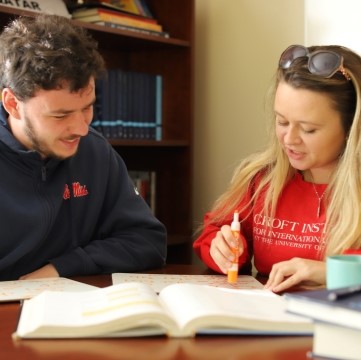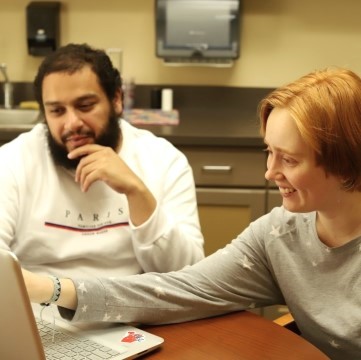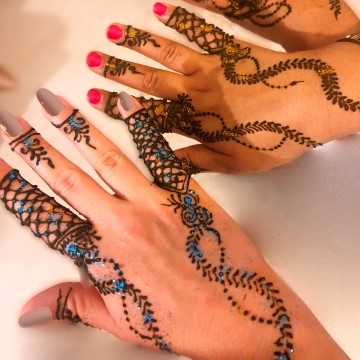Academics in Arabic Language Flagship
The Flagship program enhances Arabic language learning.
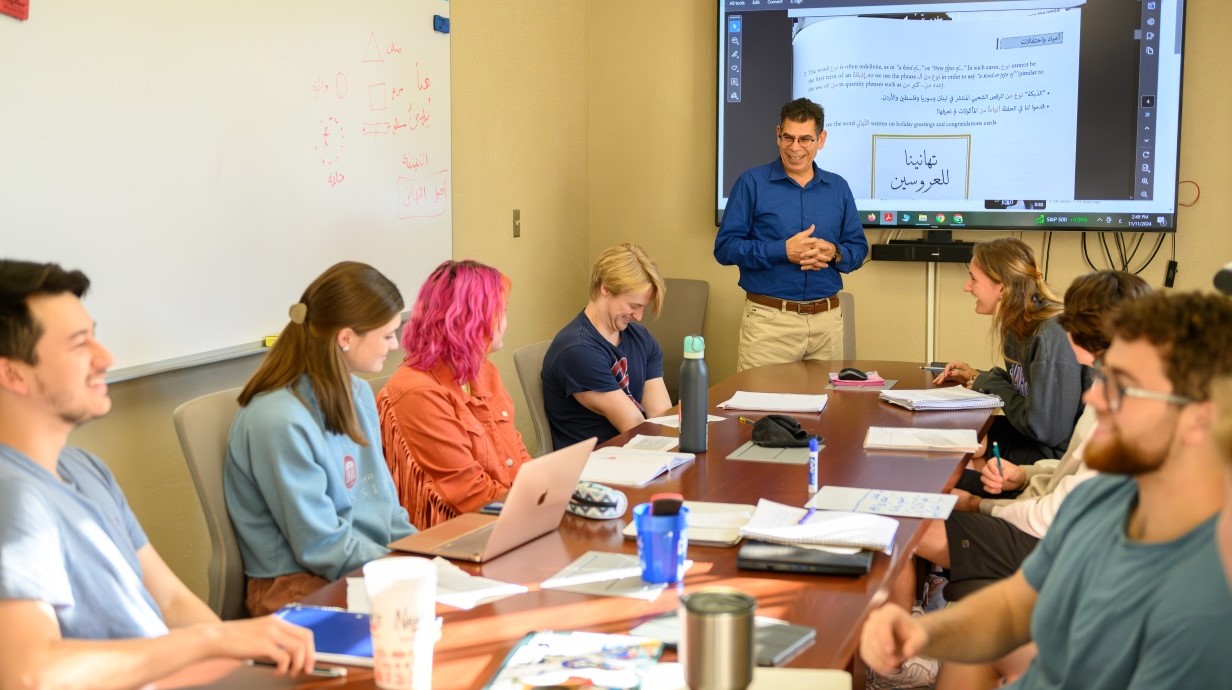
Why Arabic?
Arabic is an official language of 27 countries concentrated in the Middle East/North Africa region, and is spoken by 313 million people (the fifth most commonly spoken language). As one of the six official languages of the United Nations and the language of the Quran (the holy book of Islam), Arabic has become both politically and culturally significant in the face of increasing globalization. A very small fraction of the U.S. population studies Arabic; therefore, Arabic-speakers are increasingly in high demand in today’s workforce across many fields, including intelligence and security, journalism, global health, diplomacy, business, education, interpretation, and more.
Learning Arabic unlocks the door for increased cultural immersion, understanding, and appreciation in a wide range of countries. Iraq embraces its Mesopotamian roots as the cradle of civilization itself, and the nickname “Mother of the World” captures both ancient and modern-day Egypt’s role as an integral force in the history of humanity. The world’s first university can be found amid the winding and colorful souks (marketplaces) of Morocco, and thousands of miles away lies the birthplace of coffee and skyscrapers in Yemen. From the rich cultural traditions and resilience of the Levant region (Lebanon, Syria, Palestine, and Jordan), to the gleaming towers of the United Arab Emirates, learning the Arabic language becomes a journey across the same varied landscapes from which the foundations for the modern world were cultivated by the ingenuity and creativity of its people.
Arabic Language Flagship Program
Arabic Flagship students take intensive Arabic courses the summer before freshman year and at least one Arabic course each Fall and Spring semester, participate in at least one summer study abroad program, and complete the capstone year in Meknes, Morocco.
-

Non-Flagship Arabic Major and Minor
Students may major or minor in Arabic without participating in the Arabic Language Flagship program. Learn more about studying Arabic without being in the Flagship program.
(Non-Flagship) Arabic Major and Minor
Flagship Roadmap
To earn the B.A. in Arabic, students complete 30 semester hours of Arabic courses beyond the 200-level credits. See the full requirements in the online catalog.
Arabic Flagship is a flexible program that prides itself on its ability to adapt to students’ needs. With the Director’s permission, students may substitute courses that best fit their busy schedules. Individualized instruction can sometimes be offered in lieu of the courses listed in the roadmap. The Flagship Roadmap more than meets the requirements for the Arabic major.
The Flagship program begins on the UM campus the summer prior to the freshman year.
Learn about the Pre-Freshman Summer Program
The information below represents the most common pathway a student will take on his/her road to the Superior level of proficiency. Actual selection and timing of courses will depend on each learner’s language background, progress, and non-Arabic language coursework.
The Arabic Flagship Roadmap
| Semester | Courses (Credit Hours) | Location | Description |
| Pre-Freshman Summer | Intensive Elementary Arabic (10) | UM Campus | those with no prior knowledge of Arabic begin with an intensive eight-week language program at UM |
| Freshman Year | Intensive Intermediate Arabic (12) | UM Campus | study the vocabulary and grammar patterns to discuss topics related to daily life |
| Summer | Intensive Arabic & Dialect (6) | Amman, Jordan or Meknes, Morocco | study abroad in Jordan or Morocco; develop intercultural communicative competence through activities both inside and outside the classroom and progress from controlled language processing to automatic processing |
| Sophomore Year | Intensive Advanced Arabic & Dialect (10 ) | UM Campus | complete Arabic classes on advanced topics related to culture and society, travel, the economy, as well as introductory dialect classes in Levantine, Egyptian, or Moroccan dialects |
| Summer (optional) | Intensive Arabic & Dialect (6) | Amman or Meknes | |
| Junior Year | Arabic Media, Conversation & Dialect (10) | UM Campus | courses focus on Media Arabic, advanced dialect classes, and electives such as cinema, translation, dialectology, medical Arabic, and Quranic Arabic; begin study of a second dialect Some students choose to spend a semester abroad in Jordan, Morocco, or the UAE. |
| Senior Year | Arabic Content Courses (6) | UM Campus | courses in topics such as advanced conversational skills, Moroccan dialect, and elective courses; with a focus on advanced grammatical structures and vocabulary, students achieve the high proficiency levels required for their Capstone year; complete the Capstone application process and complete the language proficiency exams in speaking, reading, listening, and writing |
| Capstone Year | Intensive Arabic, Dialects, Content Courses, Community Service, Internship (30) | AALIM Center in Meknes, Morocco | consists of three semesters in summer, fall, and spring summer semester - live with a host family, take intensive Arabic courses in MSA and Moroccan dialect, and meet regularly with a local language partner fall semester - stay with host family or find apartment; enroll in classes at the University of Moulay Ismail (UMI); continue intensive language courses at AALIM; and participate in internship to give insights into the Moroccan workplace culture spring semester - continue to take classes at AALIM and UMI; keep current internship or select a new one |
Arabic Courses
For the basic Arabic language courses at the 100-300 level, odd-numbered courses are offered only in the Fall and even-numbered courses are offered only in the Spring. Study abroad courses may be taken during any semester. Additionally, summer sections of ARAB 111 and 112 are offered exclusively to Flagship students during Summer Terms I and II. For more information about Arabic courses, please visit the Academic Catalog.
ARAB 111: Intensive Arabic I (5 credit hours)
ARAB 112: Intensive Arabic II (5 credit hours)
ARAB 211: Intensive Arabic III (6 credit hours)
ARAB 212: Intensive Arabic IV (6 credit hours)
ARAB 311: Intensive Arabic V (3 credit hours)
ARAB 312: Intensive Arabic VI (3 credit hours)
ARAB 322: Levantine I (2 credit hours)
ARAB 323: Levantine II (2 credit hours)
ARAB 422: Levantine III (2 credit hours)
ARAB 423: Levantine IV (2 credit hours)
ARAB 317: Egyptian I (2 credit hours)
ARAB 318: Egyptian II (2 credit hours)
ARAB 417: Egyptian III (2 credit hours)
ARAB 418: Egyptian IV (2 credit hours)
ARAB 320: Moroccan I (2 credit hours)
ARAB 321: Moroccan II (2 credit hours)
ARAB 420: Moroccan III (2 credit hours)
ARAB 421: Moroccan IV (2 credit hours)
The following courses are 3 credit hours.
ARAB 411: Media Arabic
ARAB 412: Upper-Level Arabic Conversation
ARAB 415: Arabic Dialectology
ARAB 416: Language & Conflict in the M.E.
ARAB 471: Issues & Trends in Contemporary Lebanon
ARAB 511: Introduction to Arabic Literature
ARAB 512: Introduction to the Qur’an
ARAB 513: Spoken Arabic: Superior Proficiency
ARAB 514: Arabic Literature, Culture & Thought
ARAB 515: Arabic Dialectology
ARAB 215: Arabic Practicum I (5 credit hours)
ARAB 298: Intermediate Study Abroad (1-12 credit hours)
ARAB 315: Arabic Practicum II (5 credit hours)
ARAB 398: Advanced Study Abroad (1-12 credit hours)
ARAB 596: Arabic Capstone (1-15 credit hours)
ARAB 598: Arabic Capstone (1-6 credit hours)
Beyond the Classroom

Cultural Engagement
In addition to personalized weekly language practice, we offer weekly opportunities for more language engagement, such as cooking and music activities, calligraphy workshops, movie nights, book club, and more.

Global Ambassadors
Students have opportunities to interact with students from Arabic-speaking countries. For example, the Global Ambassadors program connects students from the United States and across the world to spend time each week building friendships across language and culture.
Combine Flagship with other Competitive Entry Programs
-
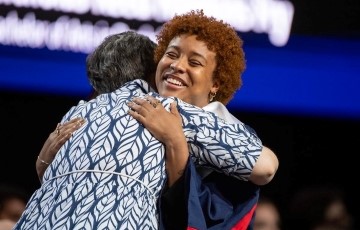
Sally McDonnell Barksdale Honors College
The Sally McDonnell Barksdale Honors College attracts a diverse body of high-performing students to The University of Mississippi and provides them a vibrant center of academic excellence to help them become outstanding in their fields and engaged citizens of their communities and the world. Established in 1997 through a gift from alumni Jim and Sally Barksdale, the Honors College merges intellectual rigor with public service. It offers an education similar to that at prestigious private liberal arts schools and universities, but at a far lower cost. Small, discussion-based classes, dedicated faculty, and a nurturing staff enable Honors College students to experience intellectual as well as personal growth.
Sally McDonnell Barksdale Honors College -

Croft Institute for International Studies
Founded in 1997, the Croft Institute for International Studies focuses on the connections between politics, economics, and culture at the international level to provide students with an understanding of the contemporary world and the tools to succeed in it. Students study abroad, gain proficiency in a foreign language, and complete a senior thesis to earn the multidisciplinary B.A. degree in International Studies. All Croft students select both a regional focus (East Asia, Europe, Latin America, or Middle East) and a thematic concentration (global economics and business, global health, international governance and politics, social and cultural identity).
Croft Institute for International Studies -

Center for Intelligence and Security Studies
CISS trains students for careers in intelligence analysis and provides educational and scholarly resources to the national intelligence community. The Center offers a minor in Intelligence and Security Studies (competitive entry) and Global Security Studies (not competitive entry). Students in the ISS minor complete an internship related to intelligence, including local and federal law enforcement or national intelligence community agencies, such as the FBI, CIA, and the Department of Defense.
Center for Intelligence and Security Studies -

Trent Lott Leadership Institute
The Lott Leadership Institute was established in 1999 to honor U.S. Senator Trent Lott, a distinguished UM graduate. It prepares students to assume positions of leadership in an increasingly complex world. Lott students earn a degree from the Department of Public Policy Leadership, which provides a challenging interdisciplinary curriculum that includes geography, philosophy, political science, public administration. The program emphasizes the global nature of responsible decision making, the ethical imperatives of leadership, critical thinking and communication skills, and the quantitative skills necessary for careful policy analysis.
Trent Lott Leadership Institute

